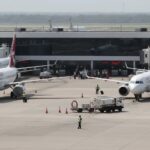In the pursuit of achieving net-zero carbon emissions by 2050, LOT Polish Airlines (LOT) has identified significant opportunities to cut fuel consumption, according to the latest findings from the IATA Fuel Efficiency Gap Analysis (FEGA).
The FEGA report, showcasing results from various airlines, reinforces the aviation industry’s commitment to reducing its carbon footprint. Marie Owens Thomsen, Senior Vice President Sustainability and Chief Economist at IATA, emphasized the impact of such efforts, stating, “Every drop matters.”
LOT, actively participating in FEGA, uncovered avenues to reduce its annual fuel usage, translating to a substantial decrease in carbon emissions. Dorota Dmuchowska, Chief Operating Officer of LOT Polish Airlines, acknowledged the importance of the findings, stating, “FEGA identified specific areas where fuel economy might be improved. The next step is implementation to achieve improved environmental performance and lower operating costs.”
The FEGA analysis revealed an average fuel saving of 4.4% per airline audited, with potential industry-wide savings equivalent to removing 3.4 million petrol-powered cars from the roads. Flight planning, aviation procedure execution, and refueling operations were highlighted as key areas for improvement.
Frederic Leger, IATA’s Senior Vice President for Commercial Products and Services, stressed the broader impact of FEGA on the industry, saying, “FEGA is an important IATA offering.” The audit not only benefits individual airlines but also contributes to the collective improvement of environmental performance across the aviation sector.
As the industry strives to transition to Sustainable Aviation Fuels (SAF) and achieve net-zero emissions, the identified fuel savings by FEGA are expected to play a crucial role. LOT’s commitment to implementing these findings underscores the airline’s dedication to environmental responsibility and economic efficiency.
















More Stories
Canada’s Airlines Halt Cuba Flights: Fuel Crisis Explodes
United’s A321neo Coastliner: Premium Transcon Revolution
US Airlines Battle for 2026 Skies: Premium Profits Soar